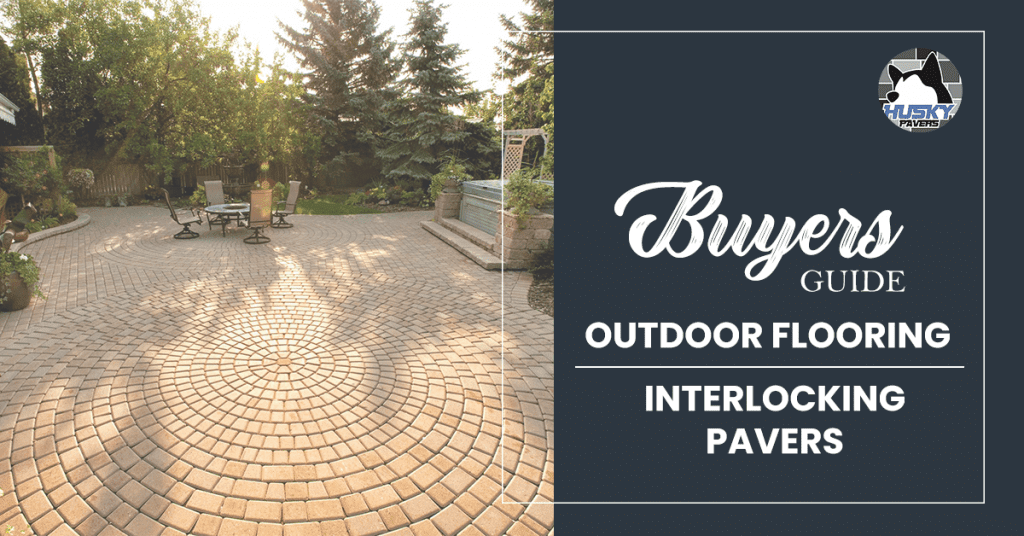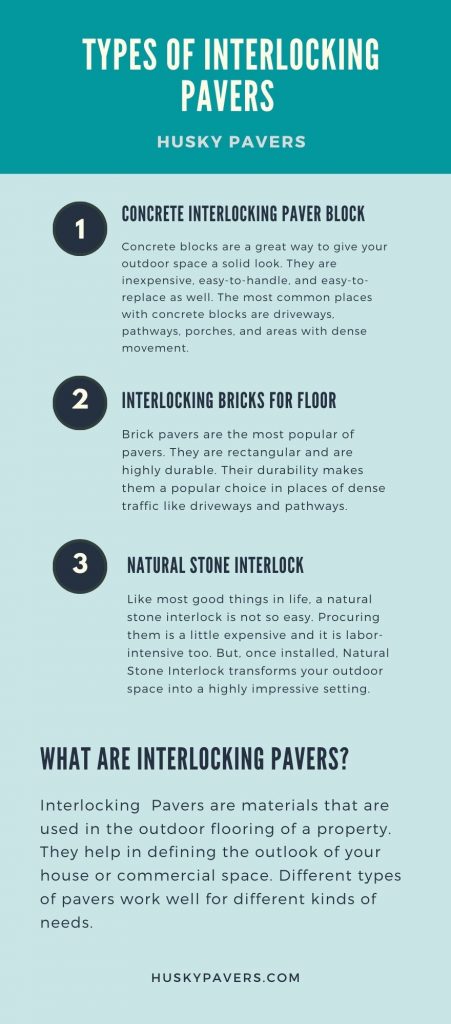
Outdoor flooring for a house involves gardens, patios, interlocking pavers, and other elements. While there is so much info for gardening and setting up patios, there is little information about interlocking pavers, their types, and how to get them laid on your property. Let us help you with those exact things and more.
What are interlocking pavers?
Interlocking Pavers are materials that are used in the outdoor flooring of a property. They help in defining the outlook of your house or commercial space. Different types of pavers work well for different kinds of needs.
Common usages include driveway, pathway in the yard, and the patio. With little planning and consultation, you can have an impressive outdoor space laid well with one or more types of interlocking pavers.

Types of Interlocking Pavers
As is the vastness of choice in home design, there is a huge variety of colors, sizes, and shapes of interlocking pavers. Let us broadly classify them into 3 types: Concrete Interlocking Paver Block, Interlocking Bricks for a floor, and Natural Stone Interlock.
- Concrete Interlocking Paver Block
Concrete blocks are a great way to give your outdoor space a solid look. They are inexpensive, easy-to-handle, and easy-to-replace as well. The most common places with concrete blocks are driveways, pathways, porches, and areas with dense movement. There are different types of concrete blocks: Basic concrete, Concrete Pavers, and Stamped/Etched Concrete.
Given that they come in various colors, sizes, and shapes, concrete interlocking pavers are a great way to transform your outdoor space within a budget.
- Interlocking Bricks for Floor
Brick pavers are the most popular of pavers. They are rectangular and are highly durable. Their durability makes them a popular choice in places of dense traffic like driveways and pathways.
They are also highly used in the construction of regular buildings. Owing to their shape and sturdy nature, they can be used to create extensive outdoor elements like the patio, fountains, porches, and more. Given their popularity, they are easily available as well. Just key in, Interlocking bricks near me on Google and you could find so many of them!
- Natural Stone interlock
Like most good things in life, a natural stone interlock is not so easy. Procuring them is a little expensive and it is labor-intensive too. But, once installed, Natural Stone Interlock transforms your outdoor space into a highly impressive setting. They look extremely elegant on patios, around swimming pools, walkways, and porches. Also, natural stones once inserted, are almost maintenance-free and highly durable.
Also, Read, Choosing the Right Outdoor Paver
While the above 3 types of interlocking are broadly classified, you may even opt for other options like wood and tiles depending on your choice. You can get a free consultation with Husky Pavers when you decide to install the Interlocking Pavers on your property.
It generally takes about a week to complete the entire process. Once installed by the experienced crew at Husky Pavers, your stunning outdoors is sure to hold its appeal through many a decade.
Installing Interlocking Pavers with Husky Pavers | Free Consultation
1, Getting the area clean and leveled.
2. Laying the bedding sand
3. Installing edge restraint to solidify the pavers
4, Install the pavers
5. Vibrate the paver area to begin interlocking
6. Fill in the sand between pavers, subject to type and need.
Seems like quite a hassle right? Not when the professionals are pedal-to-the-metal at doing this. Husky Pavers has been creating stunningly beautiful and efficient outdoor spaces across the state.to get a free consultation today, understand how you can transform your place, and get started now.
Why wait for it when a simple call or a mail can get it done.Ph: 951-348–7710 | eMail: jeff@huskypavers.com
Transform Your Outdoors | Get Free Consultation Today!
Once you have set up these, or even other types of pavers, their glamour and durability come down to maintenance. Although it is minimal in most cases, it doesn’t hurt to get familiar, does it?.
6 Easy Maintenance Tips for Interlocking Pavers
- Sweep, rinse and clean often to keep the colors bright and removed from smudges.
- To enhance the look and feel of concrete pavers, you could seal it once in 3 to 4 years. Essentially, sealing the concrete strips it of messy stains, grease or dirt. In the long run, such sealing helps to keep the concrete pavers water and crack-resistant.
- In case, you have a cracked paver, you can most often, replace it easily than repair.
- Be sure to be quick in cleaning the spills on any of the pavers before it becomes a part of the design, yikes.
- A ph neutral cleaner is best for cleaning natural stone interlock
- Use garden hose, pressure washer and brooms to clean your brick pavers
Also Read, 9 Best Patio Paver Design Ideas


 Get In Touch
Get In Touch
Recent Comments